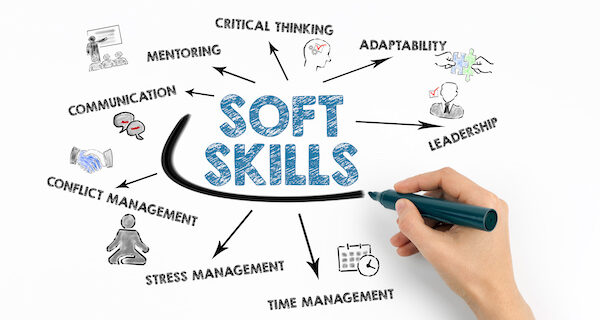A People-First Approach: Soft Skills In Facilities Management

When most people think of facilities management, the first things that come to mind are practical, daily responsibilities: cleaning restrooms, mowing lawns, repairing HVAC systems, and more are just some of the tasks that go into maintaining safe and functional spaces. These are the backbone of the profession, but they’re not the whole story.
What’s less visible but just as critical is what happens beyond the checklist. How does a facilities leader de-escalate a situation that arises? How does the team stay engaged during a hectic week of unexpected callouts? How does a manager balance the needs of the client with empathy and accuracy? The answer lies in soft skills, which are often undervalued.
Facilities management is a dynamic industry that requires a blend of technical prowess and people-savvy leadership. While operating a floor scrubber or setting up a preventative maintenance program is teachable, knowing how to lead, listen, mentor, and adapt—in a time that increasingly values automation and artificiality—takes more time, intention, and care.
What Are Soft Skills? Why Do They Matter?
Soft skills are non-technical; they enable you to connect with others, foster relationships, and tackle challenges effectively. They are what elevate a technically proficient manager into a transformational one.
These essential skills include:
- Clear communication
- Teamwork and collaboration
- Empathy and emotional intelligence
- Conflict resolution
- Adaptability
- Creativity and innovation
- Strategic problem-solving
- Mentoring and coaching
Hiring managers often prioritize technical skills, and for good reasons, they’re easy to quantify. Certifications, training hours, and on-the-job experience provide tangible proof of capability. But soft skills? They’re the glue that holds teams together, sustains partnerships, and, in many cases, ensures long-term contract success. Without them, even the most skilled operators may struggle to lead effectively.
People-Centered Leadership Builds Stronger Partnerships
In educational environments the impact of facilities teams extends beyond maintenance. These team members are the connection to student experience, community pride, and stakeholder trust.
Technical skills ensure the building is operational. But it’s soft skills that build credibility and lasting relationships. Success often hinges on how well a manager or leader:
- Addressing a teacher’s concern about classroom cleanliness without getting defensive.
- Providing school board leaders with clear, proactive updates on summer project timelines.
- Show empathy to families during emotionally charged situations.
In moments like these, communication and emotional intelligence aren’t nice-to-haves, they’re non-negotiable. Even the most advanced cleaning system can’t salvage a relationship damaged by poor communication or a lack of empathy.
Managers who actively listen, respond respectfully, and anticipate needs become trusted partners. And trusted partners are invited to the table for long-term planning and not just called when something breaks.
Building Strong Teams That Are Engaged, Committed, And Resilient
Soft skills are equally important internally, particularly in team building, retention, and leadership.
Emotionally intelligent managers recognize that team members may be carrying stress at work and at home. They lead with compassion, flexibility, and clarity. They know when to push, when to listen, and when to simply be present. Soft skills drive effective leadership by helping managers:
- Stay calm and solve problems during disruptions or staffing gaps.
- Communicate changes in a way that keeps the team aligned.
- Provide mentorship and recognition that motivates.
A team that feels seen, heard, and valued is more likely to stay engaged, perform at a high level, and stick around reducing costly turnover and preserving organizational knowledge.
Promoting Soft Skill Development In The Workforce
There’s a common myth that soft skills are innate, you either have them or you don’t. The truth is, they can be cultivated just like any technical skill. But it takes deliberate effort.
Here’s how facilities organizations can begin to foster soft skills across their workforce:
Mentorship And Coaching Programs
Nothing accelerates growth like meaningful feedback from a respected leader. Mentorship programs provide associates with a space for honest self-reflection, scenario debriefs, and personalized support.
- Schedule regular check-ins
- Discuss both wins and challenges
- Provide examples and role modeling, not just advice
This consistent engagement not only helps team members grow but also makes them feel invested in and looked after.
Targeted Soft Skill Training
Similar to how you would train a team on floor care protocols, invest in structured development programs that focus on:
- Communication and collaboration
- Adaptability and conflict resolution
- Decision making under pressure
Use real-world scenarios, role-playing, and team challenges. Encourage open conversations about what works and what doesn’t in the field. Create a safe space where managers can experiment with new approaches before applying them in a client or team meeting.
Embed Continuous Feedback Into The Culture
Feedback is not a one-time event; it’s a culture. Feedback is one of the most powerful tools, but only when it’s consistent, timely, and constructive.
- Incorporate regular one-on-ones into your teams cadence.
- Focus on development, not just critique.
- Highlight emotional intelligence, listening, and growth and not just performance metrics.
This approach reinforces that people development is part of the job, and not an afterthought.
In an industry rooted in operational excellence, soft skills may seem like a “nice” extra. In reality, they’re the force that determines whether a facility is merely managed or transformed. At its core, facilities management is a people business. It’s about how we support students and staff, how we build trust with stakeholders, and how we grow teams that care deeply about the work they do.
We will always need experts in HVAC, groundskeeping, sanitation, and safety. But if we want to build leaders, the kind that inspire, innovate, and endure we must prioritize the human skills that power connection, collaboration, and compassion.
By Vallen Emery

Emery is the Division President for SSC Services For Education.

